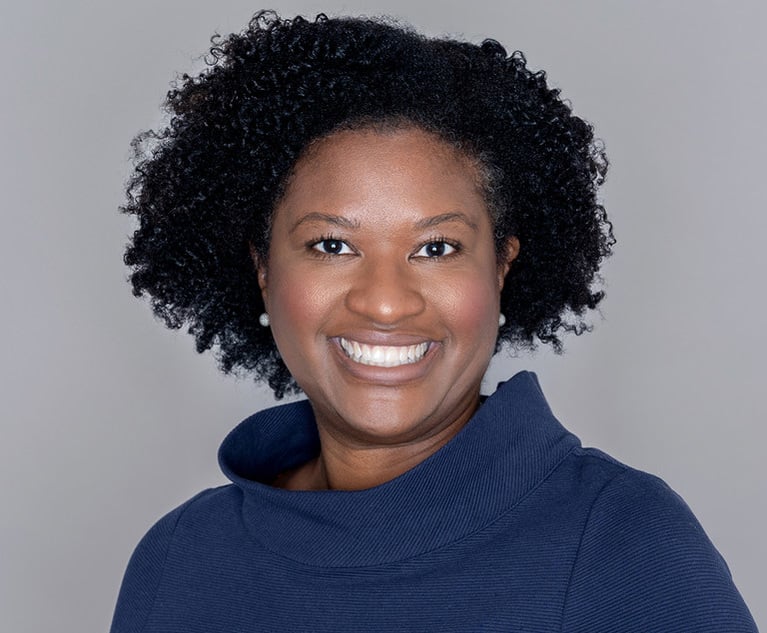Justices: Same-Sex Ex-Partner Has No Standing to Seek Child Custody
J.H. alleged in preliminary objections to C.G.'s suit that the decision to have the child, J.W.H., was hers alone and C.G.'s role was solely that of her girlfriend, according to Pennsylvania Superior Court Judge Carl Solano's opinion.
October 04, 2018 at 11:40 AM
7 minute read

The Pennsylvania Supreme Court has affirmed two lower court rulings that the former same-sex partner of a child's biological mother cannot seek custody of the child because she has no biological connection to him and has not legally adopted him.
Last year, the Superior Court in C.G. v. J.H. affirmed a Centre County judge's determination that C.G., who had been in a relationship with the biological mother of a son born in Florida through artificial insemination, was not entitled to custody of the boy because she was not legally considered a parent. The litigants are identified in court papers by their initials only.
J.H. alleged in preliminary objections to C.G.'s suit that the decision to have the child, J.W.H., was hers alone and C.G.'s role was solely that of her girlfriend, according to Pennsylvania Superior Court Judge Carl Solano's opinion. J.H. claimed that she made all of the important decisions regarding the child, that C.G. provided minimal financial support and that mother and son both moved out of C.G.'s Florida home to Pennsylvania when J.W.H. was 6 years old.
C.G. countered that she had standing in loco parentis under Pennsylvania's Child Custody Law. However, the trial judge held that because same-sex marriage and second-parent adoption was not yet legal in Florida in 2006 when J.H.W. was born, C.G. did not have standing as a parent.
The Superior Court upheld that decision and C.G. appealed. Earlier this year, the high court granted allocatur on a single issue: “Whether the Superior Court erred in affirming the decision of the trial court that a former same-sex partner lacked standing both 1) as a parent and 2) as a party who stood in loco parentis to seek custody of the child born during her relationship with the birth mother where the child was conceived via assisted reproduction with an anonymous sperm donor and the parties lived together as a family unit for the first five years of the child's life.”
On Sept. 21, the high court ruled to uphold the lower courts' rulings. While the justices were unanimous in the result, three of them diverged from the majority's analysis on several broader issues.
The majority, led by Justice Sallie Updyke Mundy, rejected the ex-partner's argument that parentage under Section 5324(1) of the custody statute should be broadened to include those who intend to bring a child into the world through assistive reproductive technology (ART) and then co-parent the child.
“The instant case is not one where a statutory presumption would be bestowed on a similarly-situated male based on cohabitation in the absence of marriage, and as highlighted throughout, the factual findings of the trial court determined that C.G. did not jointly participate in child's conception and hold him out as her own,” Mundy wrote in the majority opinion. ”Accordingly, this case does not provide this court with a factual basis on which to further expand the definition of the term parent under Section 5324(1).14.
“C.G. contends our case law stands for the broad proposition that parentage can be established by intent in situations where a child is born with the aid of assistive reproductive technology,” Mundy continued. “It does not. The jurisprudence in this commonwealth has declined to void contracts involving surrogacy and/or the donation of sperm or ova recognizing a separate mechanism by which legal parentage may be obtained (or relinquished). The facts of C.G.'s case do not place her into this narrow class of cases where legal parent rights and responsibilities have been relinquished or assumed via contract.”
Mundy's opinion was joined in full by Chief Justice Thomas Saylor and Justices Max Baer and Debra Todd.
Justice David Wecht wrote a separate concurring opinion, joined by Justice Christine Donohue, agreeing with the result but calling the case “a missed opportunity for this court to address the role of intent in analyzing parental standing in ART cases.”
He said he would “embrace an intent-based test for parentage for persons pursuing parentage through ART” that looks at whether the biological mother and the third party seeking custody ever intended to co-parent the child.
“Under the majority's formulation of parentage by contract, one becomes a parent through use of ART and the formation of a binding contract regarding ART,” Wecht said. ”Fair enough. But suppose that the members of a same-sex couple decide that one partner will become pregnant via ART and sperm donation; it is entirely foreseeable that only the partner being impregnated would contract with the ART facility. The second partner, who would have no biological connection to the child, would have no contract establishing a claim to parentage. Suppose further that no adoption is formalized, and that the couple separates after years in which both parties diligently raise and lovingly support the resulting child.
“Under the majority's approach,” Wecht continued, “the second partner has no claim to parent status and no standing to pursue any custody rights. Such a result is by no means dictated by the terms or spirit of our custody standing statute, which speaks in this regard only of '[a] parent of the child,' thus begging the question now at hand.”
Justice Kevin Dougherty penned his own concurring opinion, arguing that “nothing warrants, much less necessitates, the majority's cramped interpretation of 'parent' under 23 Pa.C.S. Section 5324(1), the inevitable result of which will be the continued infliction of disproportionate hardship on the growing number of nontraditional families—particularly those of same-sex couples—across the commonwealth.
“According to the majority, our precedent supports a conclusion parentage for standing purposes may be proven in only four ways: biology, adoption, a presumption attendant to marriage, or 'legal parentage by contract—where a child is born with the assistance of a donor who relinquishes parental rights and/or a non-biologically related person assumes legal parentage,'” Dougherty said. ”Unfortunately, even under this paradigm of parentage, it remains impossible—absent marriage or adoption—for both partners of a same-sex couple to have standing as a parent, as only one can be biologically related to the child or contract to assume legal parentage. I see no good reason why the court should continue to impose such an overly-restrictive formulation, which fails to take into account equitable principles and may ultimately frustrate the paramount concern of protecting a child's best interests.”
Counsel for C.G., Tiffany Palmer of Jerner & Palmer in Philadelphia, said in an emailed statement, “We are disappointed that the decision that C.G. did not have standing was affirmed and that the Court declined to adopt a parentage by intent standard in this case. However, it is important that the Court clarified through this opinion that there are ways to be a parent in Pennsylvania in addition to biology or adoption. The Court stated that assisted reproduction contracts are enforceable and are a means to parentage and also discussed that the martial presumption can establish one as a parent. These issues were not addressed in the Superior Court opinion. The Court seemed open to examining parentage by intent through another case in the future under a different factual scenario.”
J.H.'s attorney, Julia Rater of McQuaide Blasko in State College, could not be reached for comment.
(Copies of the 48-page opinion in C.G. v. J.H., PICS No. 18-1200, are available at http://at.law.com/PICS.)
This content has been archived. It is available through our partners, LexisNexis® and Bloomberg Law.
To view this content, please continue to their sites.
Not a Lexis Subscriber?
Subscribe Now
Not a Bloomberg Law Subscriber?
Subscribe Now
NOT FOR REPRINT
© 2025 ALM Global, LLC, All Rights Reserved. Request academic re-use from www.copyright.com. All other uses, submit a request to [email protected]. For more information visit Asset & Logo Licensing.
You Might Like
View All


Penn State Dickinson Law Dean Named President-Elect of Association of American Law Schools
Trending Stories
- 1Supreme Court Appears Sympathetic to Law Requiring Porn Sites to Verify Users' Age
- 2Cybersecurity Breaches, Cyberbullying, and Ways to Help Protect Clients From Both
- 3AI in 2025: Five Key Predictions on How It Will Reshape International Law Firms
- 4Justice Known for Asking 'Tough Questions' Resolves to Improve Civility
- 5Robinson & Cole Elects New Partners and Counsel
Who Got The Work
J. Brugh Lower of Gibbons has entered an appearance for industrial equipment supplier Devco Corporation in a pending trademark infringement lawsuit. The suit, accusing the defendant of selling knock-off Graco products, was filed Dec. 18 in New Jersey District Court by Rivkin Radler on behalf of Graco Inc. and Graco Minnesota. The case, assigned to U.S. District Judge Zahid N. Quraishi, is 3:24-cv-11294, Graco Inc. et al v. Devco Corporation.
Who Got The Work
Rebecca Maller-Stein and Kent A. Yalowitz of Arnold & Porter Kaye Scholer have entered their appearances for Hanaco Venture Capital and its executives, Lior Prosor and David Frankel, in a pending securities lawsuit. The action, filed on Dec. 24 in New York Southern District Court by Zell, Aron & Co. on behalf of Goldeneye Advisors, accuses the defendants of negligently and fraudulently managing the plaintiff's $1 million investment. The case, assigned to U.S. District Judge Vernon S. Broderick, is 1:24-cv-09918, Goldeneye Advisors, LLC v. Hanaco Venture Capital, Ltd. et al.
Who Got The Work
Attorneys from A&O Shearman has stepped in as defense counsel for Toronto-Dominion Bank and other defendants in a pending securities class action. The suit, filed Dec. 11 in New York Southern District Court by Bleichmar Fonti & Auld, accuses the defendants of concealing the bank's 'pervasive' deficiencies in regards to its compliance with the Bank Secrecy Act and the quality of its anti-money laundering controls. The case, assigned to U.S. District Judge Arun Subramanian, is 1:24-cv-09445, Gonzalez v. The Toronto-Dominion Bank et al.
Who Got The Work
Crown Castle International, a Pennsylvania company providing shared communications infrastructure, has turned to Luke D. Wolf of Gordon Rees Scully Mansukhani to fend off a pending breach-of-contract lawsuit. The court action, filed Nov. 25 in Michigan Eastern District Court by Hooper Hathaway PC on behalf of The Town Residences LLC, accuses Crown Castle of failing to transfer approximately $30,000 in utility payments from T-Mobile in breach of a roof-top lease and assignment agreement. The case, assigned to U.S. District Judge Susan K. Declercq, is 2:24-cv-13131, The Town Residences LLC v. T-Mobile US, Inc. et al.
Who Got The Work
Wilfred P. Coronato and Daniel M. Schwartz of McCarter & English have stepped in as defense counsel to Electrolux Home Products Inc. in a pending product liability lawsuit. The court action, filed Nov. 26 in New York Eastern District Court by Poulos Lopiccolo PC and Nagel Rice LLP on behalf of David Stern, alleges that the defendant's refrigerators’ drawers and shelving repeatedly break and fall apart within months after purchase. The case, assigned to U.S. District Judge Joan M. Azrack, is 2:24-cv-08204, Stern v. Electrolux Home Products, Inc.
Featured Firms
Law Offices of Gary Martin Hays & Associates, P.C.
(470) 294-1674
Law Offices of Mark E. Salomone
(857) 444-6468
Smith & Hassler
(713) 739-1250






